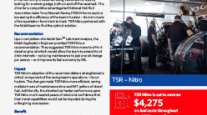Bill Seeks to End 12% Truck Tax and Raise Diesel Fuel Levy 6.3¢
This story appears in the April 9 print edition of Transport Topics.
A proposal to eliminate the 12% federal excise tax on new trucks and trailers and to raise the federal diesel tax 6.3 cents to make up for the lost revenue to the Highway Trust Fund was introduced in the U.S. House of Representatives.
Rep. Jim Gerlach (R-Pa.) and cosponsor Rep. Earl Blumenauer (D-Ore.) introduced the measure March 29. The bill, which would raise the diesel tax to 30.7 cents a gallon, is supported by American Trucking Associations, some large carriers and several truck leasing companies.
Based on the struggle the House has had getting any transportation-related measures through the legislative process, no officials were predicting that this tax plan would see the light of day anytime soon.
However, ATA President Bill Graves called the bill “exactly the kind of pro-growth, deficit-trimming legislation” lawmakers should look at to address the nation’s economic woes.
“By cutting more than $15,000 from the cost of the average new truck, eliminating the excise tax will encourage purchases of trucks, providing a boost for manufacturing, and accelerate the adoption of new technologies aimed at improving safety and fuel efficiency,” Graves said in an April 3 statement.
The tax plan was questioned, however, by some small and midsize carriers.
“I’m telling you, it is not a good thing for a small carrier like me,” said Dan Coleman, founder of D.G. Coleman Inc. in Commerce City, Colo., whose 85 tractors use 2 million gallons of fuel a year.
“That doesn’t take a lot of figuring: 2 million gallons times 6.3 cents, that’s $126,000,” said Coleman, past president of the Colorado Motor Carriers Association. “There is no way I buy anywhere close to enough new equipment . . . to erase $126,000 a year,” he said.
The Gerlach-Blumenauer bill was referred to the House Ways and Means Committee. Backers of the bill said it has no overall effect on the budget because the higher diesel tax would produce the same amount of revenue as the excise tax.
Tom Howells, president of the Wisconsin Motor Carriers Association said, “It’s not brain surgery to figure out that members who don’t buy much equipment are not going to like it, and the guys who buy equipment every year are going to think, ‘That’s the best thing since sliced bread.’ ”
Supporters of the bill said the proposed tax changes also would stabilize funding for highways and bridges.
“It would smooth out the peaks and valleys in the Highway Trust Fund that seem to cause us a lot of problems,” said Randy Mullett, vice president of government relations and public affairs for Con-way Inc., which is supporting the bill.
Conway, Ann Arbor, Mich., with more than $4.9 billion in revenue in 2010, ranks No. 3 on the Transport Topics Top 100 list of the largest U.S. and Canadian for-hire carriers.
Historically, recessions sharply cut excise tax revenue flowing into the Highway Trust Fund as fleets stop buying new equipment. Fleets continue to buy fuel, however, although at reduced levels (1-23, p. 5).
For example, in fiscal year 2008, the first year of the recession, excise tax revenue generated by new truck, trailer and bus sales dropped 62% from 2007, according to the U.S. Department of Transportation.
In contrast, during the same period, diesel tax revenue flowing into the trust fund dropped only 16%.
The 12% excise tax applies to new tractor-trailer rigs with gross vehicle weights of more than 33,000 pounds and to trailers with gross vehicle weights of more than 26,000 pounds. The tax does not apply to used trucks and trailers.
“Guys that never buy a used truck would get the benefit,” Howells said. Truckers who buy only used vehicles would see a jump only in diesel taxes, he said.
Eliminating the excise tax would spur members of the Truck Renting and Leasing Association, based in Alexandria, Va., to buy more trucks than usual, said Jake Jacoby, Trala’s vice president of government relations.
“Our members purchase between 35% and 40% of all the new trucks in North America,” Jacoby said. “In the leasing business, in particular, they have to have newer vehicles, so they don’t run these trucks as long as [other fleets].”
The newer trucks are “greener” and more technologically advanced, Jacoby said.
XTRA Lease, the St. Louis-based provider of semi-trailer rentals and leases, recently announced it had ordered 9,400 new vans and reefers for 2012 and said that, in the past 2½ years, it had bought nearly 25,000 new trailers.




